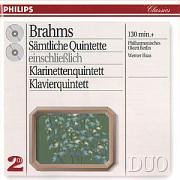| All Artists: Johannes Brahms, Berlin Philharmonic Octet, Werner Haas Title: Brahms: The Complete Quintets Members Wishing: 0 Total Copies: 0 Label: Philips Release Date: 6/13/1995 Genre: Classical Style: Chamber Music Number of Discs: 2 SwapaCD Credits: 2 UPC: 028944617221 |
Search - Johannes Brahms, Berlin Philharmonic Octet, Werner Haas :: Brahms: The Complete Quintets
 | Johannes Brahms, Berlin Philharmonic Octet, Werner Haas Brahms: The Complete Quintets Genre: Classical
|
Larger Image |
CD Details |
CD ReviewsFirst-Rate Quintets Michael B. Richman | Portland, Maine USA | 11/04/2003 (5 out of 5 stars) "I love the Philips Duo series -- you always get a lot of music in slim, space-saving jewel cases for surprisingly little money. This outstanding CD collects all four of Brahms' Quintets as performed by pianist Werner Haas and/or members of the Berlin Philharmonic Octet from the early 1970s. Originally I had bought three different CDs in order to get the very same music featured on this set -- the String Quintets by Juilliard with Walter Trampler added, the Piano Quintet (with the Dvorak PQ as well) by Guarneri and Rubinstein, and the Clarinet Quintet (coupled with Mozart's) by Emerson. Those performances were all excellent but when I began running out of room on my CD shelves (a constant problem for us serious collectors), I wised up and replaced three CDs with this one Philips Duo two-fer. Well, I certainly didn't sacrifice musical quality in my quest to consolidate my holdings. If I had to do it all over again, I would just buy this title and save myself some time, money and space." Great performances of Brahms masterpieces. Miles D. Moore | Alexandria, VA USA | 06/01/2008 (5 out of 5 stars) "This two-disc set of the Brahms string, piano, and clarinet quintets offers discerning listeners everything it should, from the standpoint of both performance and sound quality. I bought this set for the second disc--to my mind, the Clarinet Quintet and the Second String Quintet rank among Brahms' very greatest achievements--but the performances on both discs can scarcely be faulted in any particular. The Philips double-disc sets are wonderful values in general, offering state-of-the-art recordings of first-rate classical performances. I have several in my CD collection, and this collection of Brahms quintets is one of the best of them." Protestant Work Ethic John D. Pilkey | Santa Clarita, CA USA | 02/17/2007 (5 out of 5 stars) "When I first heard Brahms' prodigious Piano Quintet in F minor on a Columbia vinyl in the 1960s, the performance struck me as rough. The Werner Haas performance seems smoother; but the initial impression of roughness derives from the composition itself. The work comes from the same early stage of Brahms' career as the D minor piano concerto and like it is some of the stormiest romantic music ever written. When the main theme of the first movement gets started, it could not be more emphatic; the strings sound momentarily distraught despite going on to gentler music in major key. There may be something truculent about the key of F minor; but the music sounds like a personal, Promethean manifesto in the same way as the D minor concerto. Throughout his career Brahms sounds a note of stressful effort-- a quality he seemed to derive in part from Beethoven. The effect is the opposite of Mozart's impression of effortlessness based on the "art of concealing art." Because Brahms was from Hamburg in Protestant northern Germany, I associate this impression of stern effort with the "Protestant work ethic." Brahms reinforced this impression when he said that he envied Johann Strauss for his ability to produce so many popular melodies. Although Brahms is profoundly eloquent in his own way, easy gracefulness was not in him.
Even in the slow second movement of the F minor quintet, Brahms sounds as though he is grunting and sweating. In the 1960s my young wife used to refer to Brahms as a "tired old man." Although there is nothing tired about the music itself, it can make a hearer feel fatigued from the perpetual sense of effort. Brahms supposedly derived from Schumann; but Schumann's music is more fluent and impulsive. Brahms and Beethoven are the definition of compulsiveness in music. I was not surprised to discover that Beethoven once said, "Artists are fiery and do not weep"-- fiery, choleric, headstrong and compulsive. What I hear in Brahms' music is the same cultural theme as in Tennyson's poems "Ulysses" and "The Lotus-Eaters"-- an effort to keep striving rather than dropping out of history and turning into the likes of Debussy, master of the drifting "Lotus Eaters." What could be more compulsive than the relentless, hammering chords of the third movement of Brahms' piano quintet? The rhythm of this movement sounds like a horse managing to gallop despite having its hind legs tied together. When the composer turns to the "Poco sostenuto" at the start of the fourth movement, he halts the tempo and gives us a taste of hot tears, followed by more sound and fury signifying much. In this "Allegro non troppo," he turns to wild Gypsy music for an outlet. The work is an expressive masterpiece and furnishes a striking contrast to the equally engaging Piano Quintet in A minor by Swiss Joachim Raff. Raff's piece starts off with a comparable sense of struggle but is smoother, more gracefully lyrical and less dramatic than Brahms' furious work. Whenever I deal with Raff now, I react against a hideously negative and misguided response to his music in the Music Guide. In an environment created by such reviews, I recommend an experiment. Play Brahms' and Raff's piano quintets one after another starting with Brahms and try to explain away the sense of complementary balance and plenitude achieved by these two contrasting styles." |

 Track Listings (7) - Disc #1
Track Listings (7) - Disc #1